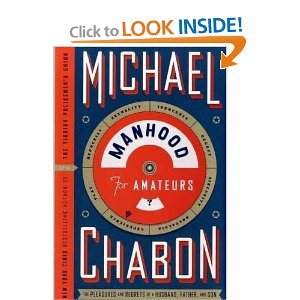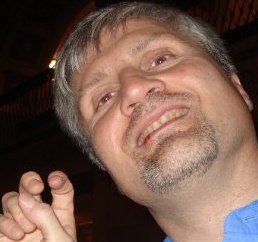Moving from Caveman Procreator to Caring Dad: The Father Myth
 in Michael Chabon’s Manhood for Amateurs:
in Michael Chabon’s Manhood for Amateurs:
The Pleasures and Regrets of a Husband, Father and Son
by Eric Cravey
Numerous studies conducted over different decades illustrate that the passage of time is the best cure for changing or re-shaping long-held public perceptions, which are sometimes referred to as the myth of what a culture believes is true. In literature, myth takes a given perception of human beings and makes them concrete to the reader. In his memoir Manhood for Amateurs: The Pleasures and Regrets of a Husband, Father and Son, Michael Chabon challenges the reader to re-think the myth of the modern father through his willingness to discuss his relationship with his father, admit personal shortcomings and being honest about his past.
Using an intimate tone, Chabon holds little back as he bares his soul to the reader. He candidly admits being part of a larger group of men who have failed and will continue to fail the tests of fatherhood because of “the steady exposure of shortcoming, weakness, and insufficiency — in particular in the raising of children. A father is a man who fails every day.” Here, Chabon challenges the belief, or myth, that fathers are either perfect or complete failures, one or the other, no in-between. But, more importantly, what he is really admitting is that fathers need to face up to their failures and, by doing so, they will be better fathers because their children will more clearly see who they really are, warts and all. In the sentence, “a father is a man who fails every day,” he is stating that it is acceptable, in fact, it is a man’s role, his duty, his higher purpose to fail in front of his children, admit it and move on. He is attempting to break a common myth in Western culture that says “men should never admit defeat” and “failure is a sign of weakness.”
In tackling the myth of father, Chabon uses a tone of understanding and gentility when he shares with the reader how his father interacts with him as a child. “My father, more or less like all men of his era, class, and cultural background, went for a certain amount of spasmodically enthusiastic fathering…” The author does not apologize for his father’s minimalist parenting, but instead, explains that that was simply what men of his era — the prevailing myth or understanding of the time — did as fathers. Further shaking up the myth of the modern father, Chabon explains the expanded, modern view of intimacy he has with his children: “There is another kind of intimacy in the conversations you may have with your children as they grow older, in which you confess to failings, reveal anxieties, share your bouts of creative struggle, regret, frustration.”. By explaining that he has deeper relationships with his children, Chabon has created a new understanding of the role of fathering. He strives each day to change the father myth.
Chabon uses a sardonic tone to unveil potentially shameful personal revelations that keep the story moving forward. He and his wife plan on discussing the specific issue of drug use with their children together. But, like much of life, things don’t always turn out as we plan them. In a scene from the memoir where his 13-year-old daughter asks him about references to drug use in Beatles’ songs, Chabon’s 10-year-old son asks him if he has used drugs before. “I was caught completely off guard. And maybe that’s why I came right out with the truth.” Here, Chabon breaks the myth that modern parents often practice that says “Keep your dirty laundry away from your kids” yet he breaks that myth and, therefore, challenges the reader to re-think the beliefs society holds about such skeletons in one’s closet. After explaining to his children that marijuana “makes you insanely hungry and thirsty. It makes you paranoid. It makes your heart race. It makes you sluggish,” Chabon turns the scene into a teachable moment. He explains: “But I mostly want us all to tell each other the truth.” In this scene, Chabon further builds on the intimate bond he has with his children, therefore modeling a new myth or way of understanding how fathers should parent.
Like many fathers, Michael Chabon takes fatherhood one day at a time. His memoir Manhood for Amateurs: The Pleasures and Regrets of a Husband, Father and Son challenges readers to re-think the myth of the modern-day father. He achieves this by writing about his relationship with his father, admitting personal shortcomings in dealing with his own children and being honest about his past.
Works Cited
Chabon, Michael. Manhood for Amateurs: The Pleasures and Regrets of a Husband, Father, and Son. New York: HarperCollins, 2009. (now out in paperback).
– is a deeply personal issue that everyone decides for himself. Sometimes the price is high, sometimes low. But this is not very important for life. Life is an interesting thing. And the price on Viagra – too.

 Eric Cravey, or White Tail Deer, was initiated in Oct. 2005 at Camp Alatoona. He has been a member of the Gainesville, Fla. I-Group and helped re-launch Jacksonville’s “Rainmakers” I-Group in 2006. He previously served two years on the Florida Coordinating Council of the Developing Florida Center and has staffed eight NWTAs. He proudly strives each day to be a myth-changing father to his son Lochlin. He is currently working on a Master of Fine Arts in Writing in Spalding University’s Brief Residency MFA Program in Louisville, Kentucky.
Eric Cravey, or White Tail Deer, was initiated in Oct. 2005 at Camp Alatoona. He has been a member of the Gainesville, Fla. I-Group and helped re-launch Jacksonville’s “Rainmakers” I-Group in 2006. He previously served two years on the Florida Coordinating Council of the Developing Florida Center and has staffed eight NWTAs. He proudly strives each day to be a myth-changing father to his son Lochlin. He is currently working on a Master of Fine Arts in Writing in Spalding University’s Brief Residency MFA Program in Louisville, Kentucky.